
Ethnobiology and Conservation
Scope & Guideline
Bridging Cultures and Conservation
Introduction
Aims and Scopes
- Ethnobiological Practices:
The journal emphasizes research on traditional knowledge related to the use of plants and animals, highlighting how these practices are intertwined with local cultures and biodiversity. - Conservation Strategies:
It explores effective conservation strategies that incorporate traditional ecological knowledge, assessing their impact on biodiversity and ecosystem management. - Human-Wildlife Interactions:
Research on the dynamics of human-wildlife relationships is central, investigating how cultural beliefs and practices affect wildlife conservation and management. - Ethnoecology and Local Knowledge:
The journal promotes studies that delve into local ecological knowledge, examining how indigenous and local communities understand and interact with their environments. - Policy and Governance:
It addresses the implications of traditional ecological knowledge on conservation policies and governance, advocating for inclusive approaches that consider local perspectives.
Trending and Emerging
- Climate Change Impacts:
There is an increasing focus on the effects of climate change on local ecological knowledge and biodiversity, highlighting the urgent need to understand these dynamics in conservation efforts. - Urban Ecology and Biodiversity:
Emerging studies address the interactions between urban environments and biodiversity, exploring how urbanization affects local ecological knowledge and conservation practices. - Political Ecology and Ethnobiology:
Themes exploring the political dimensions of ethnobiology, including governance and policy implications, are gaining prominence, reflecting a growing interest in the socio-political context of conservation. - Food Security and Biodiversity:
The intersection of food security and biodiversity conservation is increasingly addressed, emphasizing the role of ethnobiological knowledge in sustainable food practices. - Community-Based Conservation:
There is a notable trend towards research on community-driven conservation initiatives, emphasizing participatory approaches that engage local communities in biodiversity management.
Declining or Waning
- Traditional Medicinal Practices:
While still relevant, the frequency of studies specifically focused on traditional medicinal practices has decreased, possibly reflecting a broader interest in integrating these practices with modern health approaches. - Historical Ethnobiology:
Research centered on historical perspectives of ethnobiology appears to be waning, indicating a potential shift towards contemporary issues and applications rather than historical documentation. - Species-Specific Studies:
There seems to be a reduction in articles focusing narrowly on specific species, suggesting a move towards broader ecological and socio-cultural contexts rather than isolated studies.
Similar Journals

JOURNAL OF WILDLIFE MANAGEMENT
Transforming knowledge into action for wildlife preservation.Welcome to the Journal of Wildlife Management, a premier publication dedicated to advancing the science and practice of wildlife management. Published by Wiley, this journal spans decades of impactful research and has been a cornerstone in the fields of Ecology, Evolution, Behavior, and Nature and Landscape Conservation. With an impressive ranking in the Q1 quartile across multiple disciplines, it provides a crucial platform for interdisciplinary collaboration and dissemination of knowledge among researchers, practitioners, and policy-makers. Covering a wide range of topics pertinent to wildlife management, this journal promotes innovative techniques and sustainable practices that are essential in addressing contemporary ecological challenges. The Journal of Wildlife Management is rigorously peer-reviewed, ensuring high standards of quality and relevance, making it an invaluable resource for those committed to conservation and ecological research.

NORTHWEST SCIENCE
Unveiling the complexities of nature through rigorous research.NORTHWEST SCIENCE, published by the NORTHWEST SCIENTIFIC ASSOCIATION, serves as a vital resource for researchers and professionals in the fields of ecology, evolution, and systematics. With an ISSN of 0029-344X and an E-ISSN of 2161-9859, this journal has been disseminating valuable scientific insights since its inception in 1975 and continues to do so into 2024. Although currently positioned in the Q4 quartile for its category, it plays a crucial role in advancing the understanding of ecological and biological sciences, reflecting a diverse range of studies and methodologies. Researchers will find the journal particularly appealing due to its emphasis on regional studies and their implications on a global scale. While NORTHWEST SCIENCE is not an open-access publication, it provides significant contributions to the academic dialogue within its discipline, making it an essential addition to the library of any dedicated researcher, student, or professional in the environmental sciences.

Nature Ecology & Evolution
Illuminating the complexities of nature and its evolutionary pathways.Nature Ecology & Evolution is a premier journal that serves as a cornerstone for cutting-edge research in the dynamic fields of ecology, evolution, behavior, and systematics. Published by NATURE PORTFOLIO, this journal, with the ISSN 2397-334X, emphasizes high-quality, impactful studies that advance our understanding of ecological interactions and evolutionary processes. With an impressive Scopus ranking placing it in the 99th percentile—#6 out of 721 in Ecology, Evolution, Behavior and Systematics and #5 out of 461 in Environmental Science Ecology—it is classified as a Q1 journal, highlighting its significance in the research community. Established in 2016, it continues to foster an open dialogue among researchers and practitioners while facilitating the dissemination of transformative ideas that shape environmental policy and conservation strategies. While access to articles is restricted, the journal's robust impact factor underscores its relevance in scholarly discourse. Researchers, professionals, and students are encouraged to engage with the current trends and discoveries published in this leading journal, which thrives on addressing the challenges and complexities of our natural world.

PACIFIC CONSERVATION BIOLOGY
Exploring the depths of ecology to inform conservation practices.PACIFIC CONSERVATION BIOLOGY is an esteemed academic journal published by CSIRO PUBLISHING, dedicated to advancing research in the fields of ecology and nature conservation. With a strong focus on the unique challenges and biodiversity of the Pacific region, this journal serves as a crucial platform for researchers, conservationists, and students alike to disseminate high-quality, impactful findings. Operating from Australia, it has become a significant resource since its inception in 1993, navigating through nearly three decades of vital scholarly communication. Ranked in the Q2 category for both Ecology and Nature and Landscape Conservation as of 2023, PACIFIC CONSERVATION BIOLOGY maintains rigorous standards, as reflected in its successful Scopus rankings. The journal plays a pivotal role in addressing pressing ecological issues and fostering innovative conservation strategies, making it an essential reference for anyone involved in environmental science. Access options for the journal facilitate widespread distribution of knowledge, supporting the mission to promote informed decision-making in conservation practices.
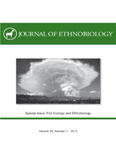
JOURNAL OF ETHNOBIOLOGY
Illuminating the Pathways of EthnobiologyJOURNAL OF ETHNOBIOLOGY, published by SAGE PUBLICATIONS INC, stands at the forefront of interdisciplinary research in the fields of ethnobiology, anthropology, and the biological sciences. With an ISSN of 0278-0771 and an E-ISSN of 2162-4496, this esteemed journal boasts a remarkable impact, categorized as Q1 in both Animal Science and Zoology, Anthropology, and Plant Science as of 2023. Ranking in the top percentiles among its peers on Scopus—29th in Anthropology and 69th in Animal Science—this journal plays a critical role in advancing our understanding of the complex relationships between humans and their biological environments. Covering a wide array of topics from traditional ecological knowledge to conservation strategies, the JOURNAL OF ETHNOBIOLOGY is dedicated to fostering scientific dialogue and innovation. With an emphasis on original research and reviews, the journal serves as an essential resource for researchers, professionals, and students alike, facilitating a deeper comprehension of the intricate networks of life that sustain our planet. The journal's contributions significantly influence both theoretical and practical applications in biodiversity and cultural heritage, making it indispensable for anyone engaged in these vital fields.
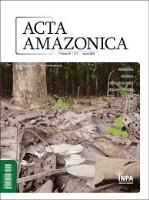
ACTA AMAZONICA
Empowering Global Dialogue on Amazonian Challenges.ACTA AMAZONICA, an esteemed journal published by the Instituto Nacional de Pesquisas da Amazônia, is a pivotal resource in the fields of Agricultural and Biological Sciences, reflecting its stature with a 2023 Q2 category ranking. Since its inception in 1979 and transitioning to Open Access in 2003, this journal has dedicated itself to disseminating significant research related to the Amazon region, contributing to the understanding of its biodiversity, ecology, and sustainability challenges. With an ISSN of 0044-5967 and E-ISSN 1809-4392, ACTA AMAZONICA provides a platform for researchers, professionals, and students to share innovative findings and insights. Based in Manaus, Brazil, it plays a critical role in fostering collaborative research efforts that address environmental and conservation issues pertinent to the Amazonian context. Its commitment to accessibility ensures that valuable research is available to a wide audience, fulfilling its objective of promoting knowledge and encouraging dialogue amongst the global scientific community.
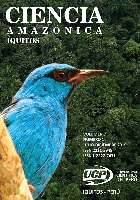
Ciencia Amazonica
Connecting Cultures and Ecosystems: Your Gateway to Amazonian ResearchCiencia Amazonica is a prominent academic journal dedicated to the exploration and dissemination of research pertaining to the Amazon region, reflecting the rich biodiversity, cultural heritage, and environmental challenges that characterize this unique ecosystem. Published by UNIV CIENTIFICA PERU, this journal has embraced an Open Access model since 2011, ensuring that valuable scientific findings are freely accessible to researchers, professionals, and students worldwide. With its commitment to fostering collaborative research and dialogue, Ciencia Amazonica serves as an essential platform for sharing innovative studies, fostering conservation efforts, and promoting sustainable development practices within the Amazon Basin. As the journal continuously seeks to engage with critical issues faced by this vital region, it is a crucial resource for anyone interested in the complex interplay of ecology, social sciences, and environmental policy in the Amazon.
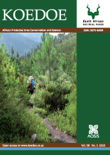
KOEDOE
Elevating the conversation in ecology and environmental science.KOEDOE, an esteemed journal in the field of ecology and environmental science, has been a vital platform for scholarly discourse since its inception in 1958. Published by AOSIS in South Africa, this open-access journal facilitates the dissemination of high-quality research and insights, contributing to advancements in ecological understanding and practice. With an impressive Q2 ranking in Ecology and Q3 ranking in Ecology, Evolution, Behavior, and Systematics as of 2023, it serves as a crucial resource for researchers, professionals, and students alike. The journal’s commitment to open access ensures that the latest findings are readily available to a global audience, fostering an inclusive academic community. KOEDOE's inception periods span significant years, marking its evolution alongside the ecological challenges of our time. Its Scopus ranking underscores its impact and relevance in the fields of agricultural and biological sciences, making it an essential read for those seeking to deepen their understanding of ecological dynamics.
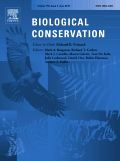
BIOLOGICAL CONSERVATION
Transforming Conservation Strategies Through Rigorous Research.BIOLOGICAL CONSERVATION, published by Elsevier Science Ltd, is a leading international journal dedicated to advancing the science and practice of biological conservation. Since its inception in 1968, the journal has provided a critical platform for researchers, professionals, and students in the fields of Ecology, Evolution, Behavior, and Systematics as well as Nature and Landscape Conservation. With an impressive impact factor, and ranked in the Q1 category within both ecological and conservation domains in 2023, it emphasizes high-quality empirical and theoretical research essential for understanding and addressing pressing environmental challenges. Although it follows a subscription model, the journal is known for its rigorous peer-reviewed articles that contribute significantly to the field, ensuring that the latest findings and methodologies are readily accessible to practitioners. As a vital resource for those engaged in conservation efforts globally, BIOLOGICAL CONSERVATION stands out for its commitment to enhancing knowledge and informing strategies that safeguard biodiversity across ecosystems.

ANIMAL BIODIVERSITY AND CONSERVATION
Bridging research and action in animal conservation.ANIMAL BIODIVERSITY AND CONSERVATION is a distinguished open-access journal dedicated to advancing the knowledge of animal biodiversity and conservation practices. Published by the esteemed MUSEU DE CIENCIES NATURALS-ZOOLOGIA in Spain, it provides a platform for researchers and professionals in the fields of Animal Science and Nature Conservation. With its ISSN of 1578-665X and E-ISSN 2014-928X, the journal has been committed to open access publication since 2001, ensuring that valuable research is easily accessible to a global audience. As of 2023, it holds an impressive Q2 ranking in both Animal Science and Zoology and Nature and Landscape Conservation, reflecting its impact and relevance in the scholarly community. The journal covers a broad scope of topics, contributing vital insights and fostering discussions that support the conservation of biodiversity. With key Scopus rankings revealing its standing among the top journals in its field, ANIMAL BIODIVERSITY AND CONSERVATION continues to be an essential resource for researchers, conservationists, and students dedicated to understanding and preserving the rich tapestry of life on our planet.